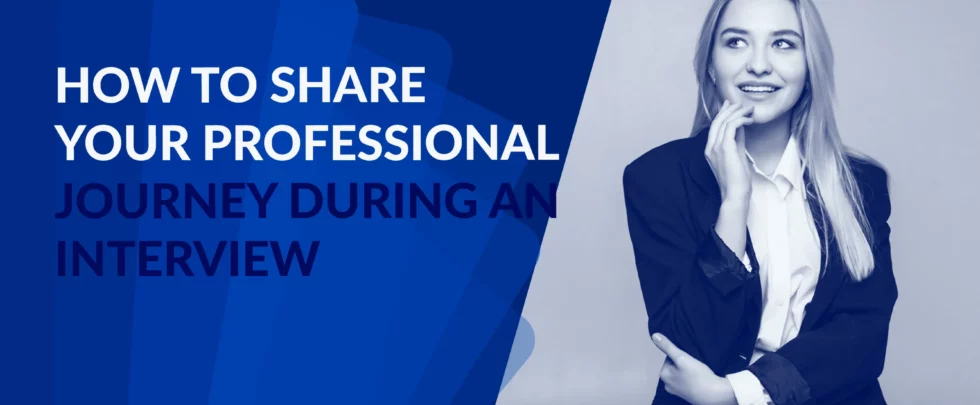During a job interview, it’s common for interviewers to ask questions about a candidate’s professional journey.
This includes questions about their previous work experiences, career goals, and the skills they’ve developed along the way. Sharing your professional journey can be a powerful way to demonstrate your qualifications, highlight your achievements, and build rapport with the interviewer.
However, talking about your professional journey in an interview can be a daunting task, especially if you’re not sure how to structure your response or what information to include.
In this article, we’ll provide you with some tips and strategies for sharing your professional journey in an interview, including how to prepare in advance, what to focus on during the interview, and how to effectively communicate your experiences and achievements.
Whether you’re a recent graduate or an experienced professional, these tips will help you showcase your unique story and stand out as a top candidate for the job.
So, let’s get into it shall we?
Reflect on Your Professional Experiences
Before you can share your professional journey, it is essential to reflect on your past experiences. Take some time to review your resume, focusing on the major milestones and achievements throughout your career.
Consider what you have learned from each role, the challenges you faced, and the skills you developed. This reflection will help you identify the key moments that shaped your career and allow you to discuss them confidently during an interview.
This reflection is also important from another perspective, it shows your hiring manager to see that you are an honest person who is quite forth coming, these are both great traits to have!
Another thing to keep in mind is that as you reflect on your professional experiences, it’s important to think about your long-term career goals and how your previous experiences have helped you get closer to achieving them.
This can include opportunities for growth and development, as well as challenges and setbacks that have taught you valuable lessons. By reflecting on both the highs and lows of your professional journey, you’ll be able to communicate a well-rounded and authentic story that highlights your unique strengths and qualifications.
Choose Relevant Stories
The second thing on our list here is choosing relevant stories, but what does that mean?
When talking about your professional career in a job interview, choosing relevant stories is crucial, because you don’t want to say just whatever.
Sharing stories that demonstrate your skills and experiences can help the interviewer understand your capabilities and assess whether you’re a good fit for the job.
However, it’s important to choose stories that are relevant to the position you’re applying for and the company culture.
To choose relevant stories, start by reviewing the job description and researching the company. This will help you understand the key skills and qualities that are required for the job, as well as the company’s mission and values.
Once you have a clear understanding of what the interviewer is looking for, you can select stories that demonstrate your relevant experience and align with the company’s culture and values.
When selecting stories to share in the interview, be sure to focus on the positive aspects of your experiences. This includes highlighting achievements and successes, as well as lessons learned from challenges or setbacks.
Choose stories that demonstrate your problem-solving skills, communication abilities, and teamwork, as these are qualities that are highly valued in many industries.
By choosing relevant and positive stories, you’ll be able to make a strong impression on the interviewer and demonstrate your potential as a valuable addition to the team.
Craft a compelling narrative
This goes hand in hand with the relevant stories you would have chosen because without tying those with a solid compelling narrative, it is almost as though you will allow for gaps in your story about your professional carrier.
This is because crafting your own compelling narrative is another excellent way to reel whoever is interviewing you in your story and give them something for their brain to latch on to. Doing this will allow you to talk about your professional career in a job interview.
A well-crafted narrative can help you present yourself in a way that is very clear, concise, and memorable. This makes it very easy for your interviewer to recognize your experiences and qualifications. To achieve this, you need to sell a version of this narrative that is not only relevant but engaging too.
So, you must be wondering how you can do that. Well, to start crafting your narrative, consider what you want the interviewer to know about you and your professional journey.
This can include your career goals, key achievements, and the unique skills and qualities that set you apart from other candidates.
Think about the challenges you’ve faced and the lessons you’ve learned along the way, as well as the people who have influenced and supported you throughout your career.
When crafting your narrative, it’s important to keep it concise and focused. Choose a few key themes or experiences that you want to highlight and structure your story around those themes.
Use clear and descriptive language to help the interviewer visualize your experiences and include specific examples that demonstrate your skills and accomplishments.
If you correctly craft a compelling and well-structured narrative, you’ll be able to showcase your strengths and qualifications in a way that resonates with the interviewer and helps you stand out as a top candidate for the job.
Be Concise and Engaging
When you are crafting a compelling narrative or creating an engaging storyline, this does not mean you should keep every detail in there, because not every detail is relevant to what you are trying to achieve!
You want to make sure you convey the most important information about your skills, experience, and achievements without overwhelming the interviewer with unnecessary details. By being concise and engaging, you can ensure that the interviewer remains interested and focused on your responses.
One effective way to be concise and engaging is to use the STAR method when answering behavioral questions. STAR stands for Situation, Task, Action, and Result. This approach involves briefly describing the situation you were in, the task you needed to accomplish, the action you took to accomplish it, and the result of your actions. This approach allows you to give a clear and concise answer while still providing enough detail to demonstrate your skills and experience.
Another way to be concise and engaging is to use storytelling techniques. Stories are a powerful way to connect with the interviewer and make your experiences more memorable. Start by choosing a relevant experience or achievement, and then craft a story around it. Use vivid language and imagery to help the interviewer visualize the situation and the impact you had. Keep the story concise and focused, and make sure it highlights the skills and qualities that are most relevant to the job you’re applying for.
Tell it like a Story
Telling your career journey like a story is a great way to make a lasting impression during a job interview.
This approach allows you to take the interviewer on a journey, showing them how you arrived at your current place in your career. By framing your journey as a story, you can engage the interviewer, highlight your key achievements, and showcase the skills and qualities that make you a great fit for the job.
To tell your career journey like a story, start by identifying the key moments in your career. Think about the experiences and achievements that have had the most significant impact on your professional development.
Once you have a clear idea of these moments, you can start to structure your story around them, using them as anchor points to guide your narrative.
As you tell your story, make sure to highlight your growth and development over time. Discuss the skills you’ve acquired, the challenges you’ve overcome, and the accomplishments you’re most proud of.
Be sure to emphasize how each experience has prepared you for the role you’re applying for and how it aligns with the company’s goals and values.
Final Words
Sharing your professional journey in a job interview can be a daunting task, but with the right approach, it can be a powerful way to showcase your skills, experience, and unique qualities.
By reflecting on your experiences, choosing relevant stories, crafting a compelling narrative, and being concise and engaging, you can make a strong impression on the interviewer and increase your chances of landing the job.
Remember that the key to sharing your professional journey effectively is to be authentic and genuine. Don’t be afraid to share your successes and failures and highlight the lessons you’ve learned along the way. This will help you build a connection with the interviewer and demonstrate that you’re the right fit for the company culture.
With these tips in mind, you’ll be well-prepared to talk about your professional journey in your next job interview.


